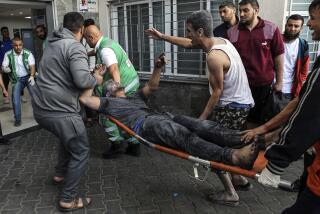U.S. Rapidly Checking Off Anti-Terrorism Goals List
- Share via
Progress on goals of the military campaign in Afghanistan since they were outlined Oct. 7 by Defense Secretary Donald H. Rumsfeld:
* Acquiring intelligence that will assist planning for future attacks against Osama bin Laden’s Al Qaeda terrorist network and Afghanistan’s Taliban rulers: After a slow start, U.S.-backed forces moved quickly. Military successes grew as more intelligence was gathered and as American special forces inside Afghanistan helped guide bombing strikes.
* Changing “the military balance over time”: The United States supported the Northern Alliance and helped supply it with equipment and air cover.
* Developing relationships with groups in Afghanistan that oppose the Taliban and Al Qaeda: Rumsfeld did not name any at the time, but they clearly included the northern alliance.
* Making it more difficult for Al Qaeda to use Afghanistan freely as a base of operations: U.S. warplanes extensively bombed Al Qaeda training camps while American-backed opposition fighters drove Taliban protectors out of power throughout most of Afghanistan.
* Making clear to the Taliban leaders and their supporters that “harboring terrorists is unacceptable and carries a price”: The price it carried for the Taliban was being driven from power.
* Providing humanitarian relief to Afghans: Humanitarian relief efforts were being stepped up as winter approached.
Progress on goals outlined by President Bush in his Sept. 20 address to Congress:
* Demanded that the Taliban deliver to the United States “all the leaders of Al Qaeda who hide in your land,” turn over other terrorists to “appropriate authorities,” release imprisoned foreign nationals, shut down terrorist training camps, and grant the United States full access to them.
The Taliban refused to bow to any of the demands, resulting in U.S. military action. The United States bombed the camps and gained effective access to much of the country by virtue of military successes by the northern alliance and other opposition fighters.
The foreign nationals referred to by Bush--eight Christian aid workers, including two Americans--were rescued after the Taliban fled the capital city of Kabul.
Al Qaida founder Bin Laden remains at large, as do most of his lieutenants. Mohammed Ataf, his top deputy and Al Qaeda’s military chief, was reportedly killed in a bombing raid.
* “We will starve terrorists of funding, turn them one against another, drive them from place to place, until there is no refuge or no rest,” said Bush. “And we will pursue nations that provide aid or safe haven to terrorism.”
U.S. officials report progress in choking off funds to Al Qaeda, largely thanks to cooperation from other nations and international banks.
The United States has yet to engage in military activity outside Afghanistan. Hard-liners inside the administration want Iraq to be the next target. White House spokesman Ari Fleischer says the focus remains the operation in Afghanistan, which he calls “phase one.”
More to Read
Sign up for Essential California
The most important California stories and recommendations in your inbox every morning.
You may occasionally receive promotional content from the Los Angeles Times.













